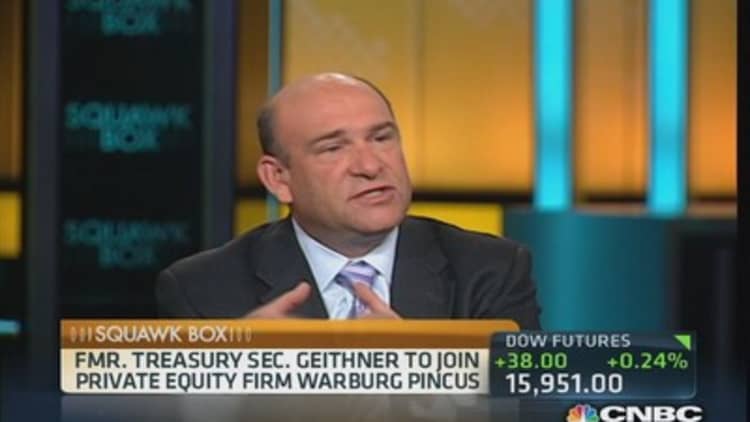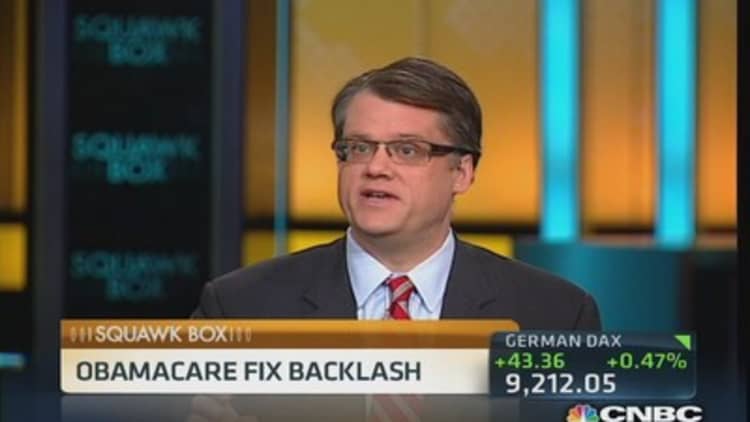The top news along the Washington-Wall Street corridor over the weekend was that former Treasury Secretary Timothy Geithner would join Warburg Pincus this spring as president of the private equity firm.
In entirely predictable fashion, Geithner came in for heavy criticism from some on the left for "cashing-in" by joining Wall Street after serving as an industry regulator and manager of the 2008-2009 bank bailout.
The problem with much of the criticism is that it fails to actually pinpoint what it is that Geithner is doing wrong, beyond the vague notion that he is somehow reducing people's confidence in regulation.
He is not joining a publicly traded bank that he oversaw as a regulator. Warburg Pincus certainly got hurt in the financial crisis when credit froze up, but it did not require a bailout. It is also hardly a swash-buckling, "Barbarians at the Gate"-style buyout firm known primarily for gorging itself on special dividend payments while larding up companies with debt and laying off thousands.

The criticism also mainly neglects to mention that Geithner and his then-boss, President Barack Obama, inherited the Wall Street bailout from the Bush administration. And it fails to ask the fundamental question of what, exactly, the administration was supposed to do with the banking sector, let it fail and turn a crushing recession into a lasting depression?
(Read more: Obama's worst week so far: Why it matters)
Geithner also helped write the Dodd-Frank financial reform law, which put into place procedures to wind down rather than bail out failing banks, limit proprietary trading, enhance capital and otherwise try to prevent another catastrophic crisis.
There are plenty of legitimate criticisms of the Dodd-Frank law, including that its central risk-limiting plank, the Volcker Rule, could be delayed for a year.
(Read more: Fed considering a delay to Volcker rule)
But it's a big stretch to suggest Geithner stood in the way of stronger reform in order to win a place for himself on Wall Street. That's simply not supported by any facts.
It's also true that private equity executives have so far escaped higher taxation on their carried interest profits. But Geithner and the Obama administration supported raising those levies to regular income tax levels. Congress has so far refused to go along.
Another line of criticism is that it's hypocritical for Geithner to join the private equity world after the Obama campaign spent so much time trashing GOP nominee Mitt Romney in 2012 over Romney's career in private equity.
This line has slightly more substance to it than the others but it's not as though Geithner himself was out on the stump trashing Bain Capital or the private equity industry during the campaign.
(Read more: Is the Fed really driving up stock prices?)

Perhaps the oddest line of attack is that Geithner is only getting the job because of his former government role and ability to open doors and influence people and that he has no valuable market or investment experience to justify his hiring.
Geithner, of course, actually spent much of his time at Treasury managing the government's massive investment in the banking sector, to fairly remarkable success, often timing the sale of holdings, such as in Citigroup and AIG, to turn a handsome profit for taxpayers.
"For more than three years, Geithner oversaw the largest portfolio in the world with more than $400 billion invested in banks, AIG, the car companies, and illiquid assets," said a person close to the former Treasury secretary. "And while we never want to see the government that involved in the private sector again, the entire portfolio delivered huge returns for taxpayers." The person added, "If Geithner and his team had been paid like private sector managers [2 percent of assets under management and 20 percent of profits], it's safe to say none of them would have to work again."
There are those who say Geithner should have headed a university or a nonprofit group. Those are both perfectly reasonable things to do, but Geithner, after leaving office, made it clear to anyone who would listen that he had no plans to do either of them and that his skill set lay much more in understanding global finance and making sound investment decisions.
And the entire nature of the Geithner critique suggests a general belief that not-for-profit and government service (which Geithner did a lot of over his career) is noble and good and just while going into the private sector is somehow sinister and dark and wrong. That's the only real "corrosive" element of the Geithner discussion.
— By Ben White, POLITICO's chief economic correspondent and a CNBC contributor. White also authors the daily tip sheet POLITICO Morning Money [politico.com/morningmoney] Follow him on Twitter @morningmoneyben.


